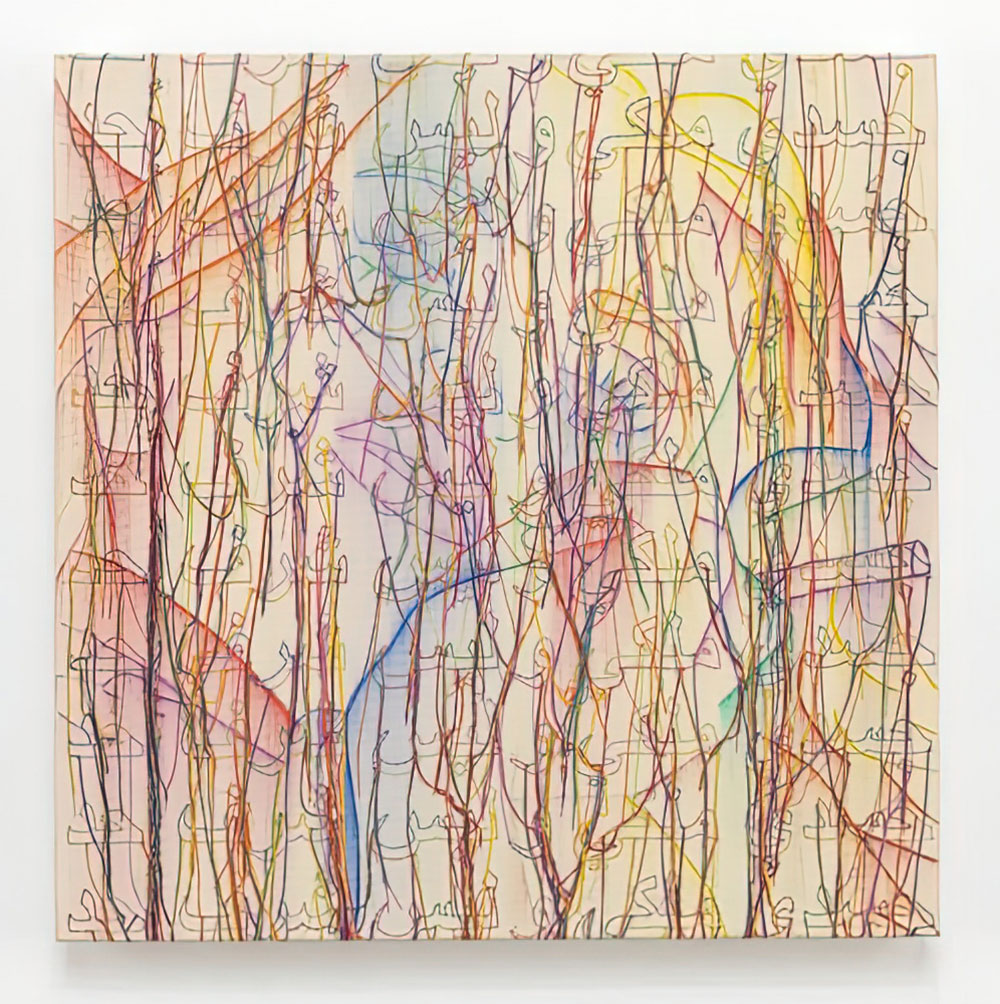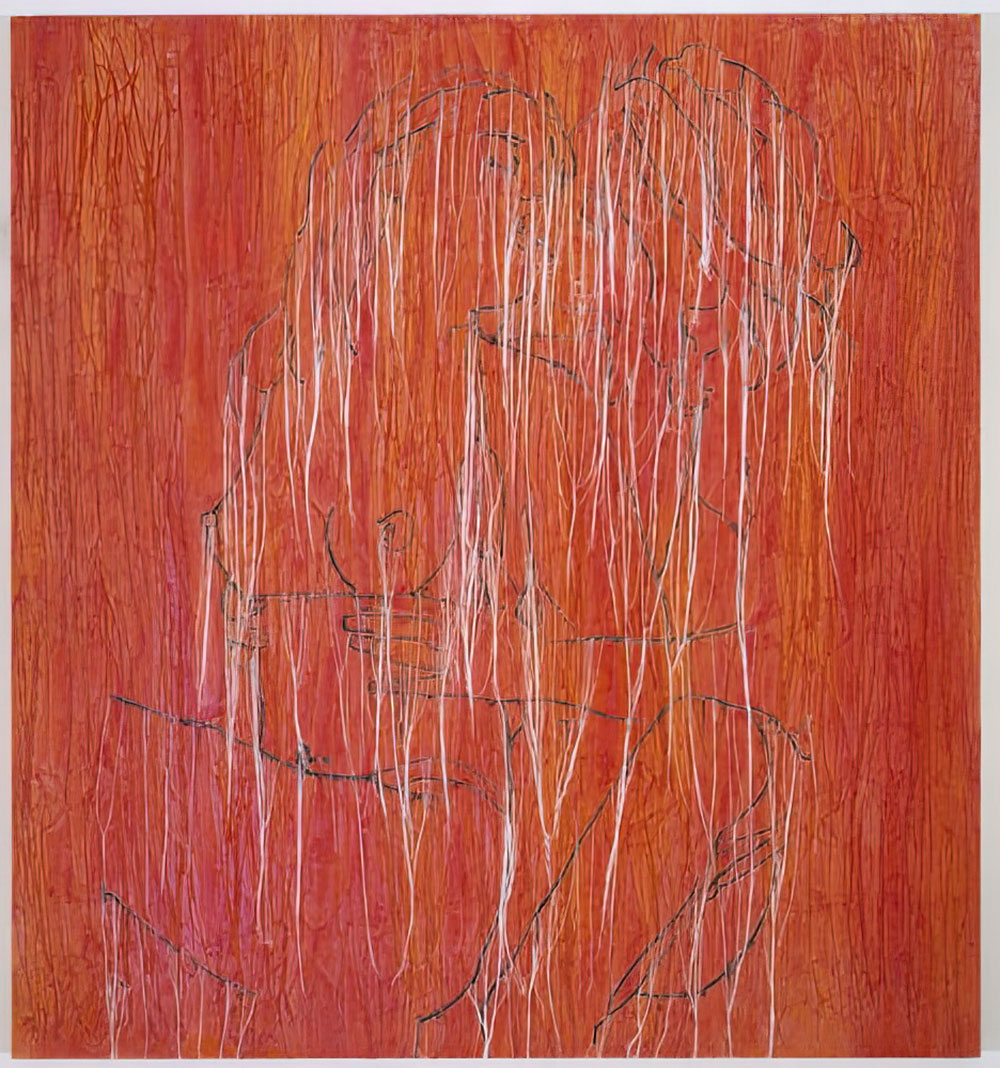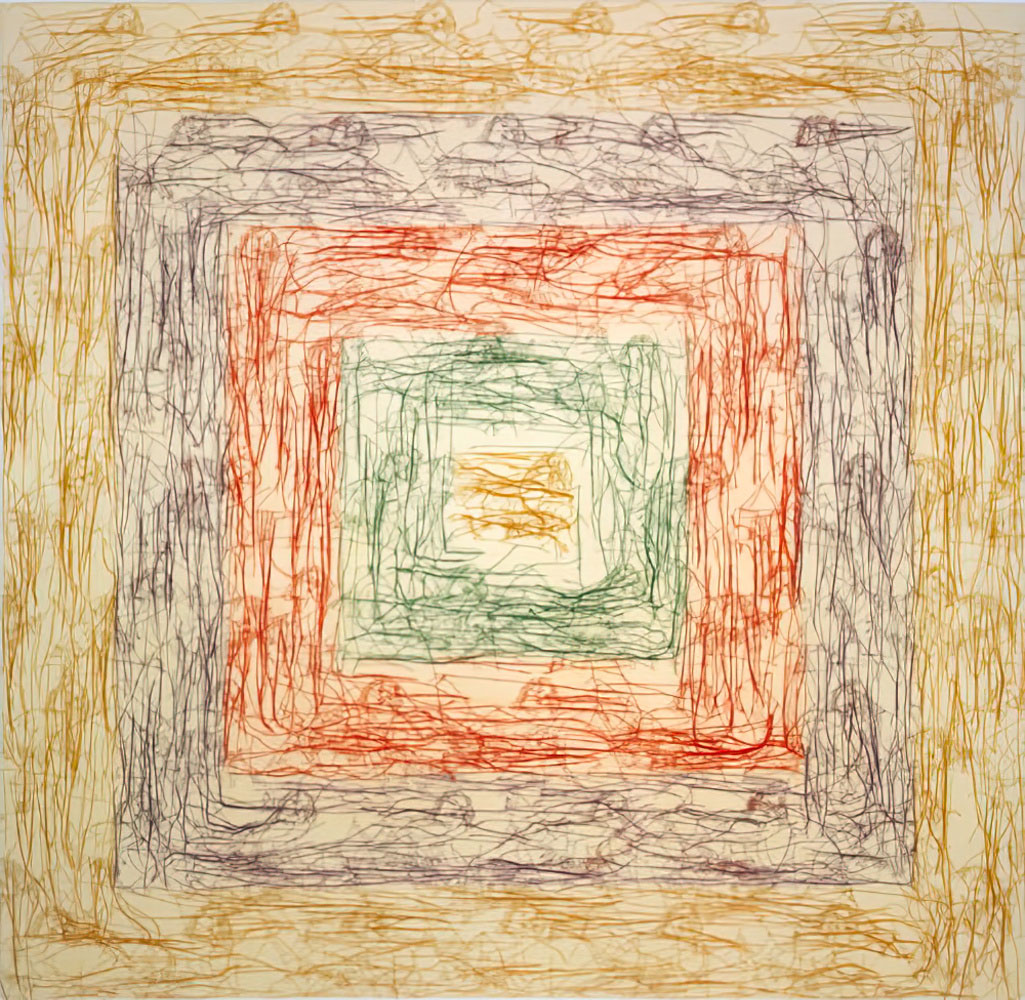PRESENTATION: Ghada Amer
 While Ghada Amer describes herself as a painter and has won international recognition for her abstract canvases embroidered with erotic motifs, she is a multimedia artist whose entire body of work (bronze sculptures, clay ceramics, prints, installations, videos, and outdoor gardens) is infused with the same ideological and aesthetic concerns.
While Ghada Amer describes herself as a painter and has won international recognition for her abstract canvases embroidered with erotic motifs, she is a multimedia artist whose entire body of work (bronze sculptures, clay ceramics, prints, installations, videos, and outdoor gardens) is infused with the same ideological and aesthetic concerns.
By Dimitris Lempesis
Photo: Mucem Archive
The exhibition “Ghada Amer” is the first retrospective of the artist in France. Taking place in three venues (the Mucem, the Frac Provence-Alpes-Côte d’Azur and the chapel of the Centre de la Vieille Charité), it brings together the different modes of plastic expression of the Franco-American-Egyptian artist, from her beginnings to her most recent creative work. Embroidery, painting, ceramics, bronze and the creation of gardens are at the heart of her art. Between East and West, Ghada Amer questions representations, relationships of domination, processes of assimilation, and opposition or translation from one culture to another. Today she is a major voice in post-colonial and feminist issues in contemporary creative work. At the Mucem and the exhibition entitled “Ghada Amer, East – الشرق – الغرب – West” the artist’s transcultural and international career takes centre stage: the so-called Orient, its perception by the West, the translatability of one culture into another, religion, and the status of women are all themes on which Ghada Amer delivers a personal, committed and nuanced vision, asserting herself as one of the great voices in the current debates on the post-colonial challenges of creative work. Ghada Amer’s first garden-sculpture, (in Arabic) “A Woman’s Voice Is Revolution”, is presented in the threshing area of the Fort’s gardens (from 17 September 2022 to 16 April 2023). At the Frac Provence-Alpes-Côte d’Azur is shown the exhibition “Ghada Amer, Witches and Bitches” For Ghada Amer, the question of women transcends that of cultural or religious affiliation. Resolutely feminist, she has taken up the traditionally feminine medium of embroidery as a painter. Between homage and vindication, her paintings enter into a dialogue with the “masters” of an art history that has been dominated by men for too long. They develop under the sign of a jubilant creative power and a new interest for portraiture. At the chapel of the Centre de la Vieille Charité, Musées de Marseille is presented the ehibition “Ghada Amer, Sculptor”. Through fascinating transfers from one technique to another, Ghada Amer’s pictorial experimentations invest the field of sculpture through installations and landscape sculptures, as well as ceramic and bronze works recently pushed in the direction of monumentality.
Ghada Amer’s “Le Salon Courbé” (2008) is a lounge, a comfortable place that can host the public and predispose it to a possible discussion. Here the artist would like compare two different cultures: the Middle Eastern and the Western one. The viewer can find many definitions of the word “terrorism” in English and in Arabic and he has to understand both languages in order to comprehend the gaps that those two defintions carry. Ghada Amer uses crafts from Egypt such as carpet and furniture copying neo colonialist style and some crafts of Western taste like wallpaper. The wallpaper gathers the definition of the word terrorism in English since it has been created during the French revolution with the Reign of Terror. The 100 knot silk and wool handmade carpet carries the definition of the word terrorism in arabic. The same meaning is embroidered on a post-colonial sofa using the old craft of the Middle East. “A Woman’s Voice is Revolution” is undoubtedly one of the artist’s most politically charged garden installations. With this new work, Ghada Amer challenges directly the well-known Arabic proverb “A Woman’s Voice is shameful” (صوت المرأة مخجل). This proverb is based upon a much disputed hadith (the tradition of the sayings of the Prophet) reported by respected Muslim jurist Al-Bukhari (ca. 808-870 CE) that states that people who entrust their affairs to women will never prosper. For centuries, this hadith has been strategically used by some politicians and orthodox theologians to denounce women’s voices for being a source of social and political upheaval and chaos. In this regard, a woman’s voice is like her body or her hair, present only to be hidden from earshot, from eyesight. If a woman’s body is to be covered with a veil, according to some conservative Muslims, a woman’s voice is to be silenced for it is scandalous, reprehensible. It introduces religious confusion, social discord and political strife. Listening to a woman’s voice, especially when soft, tempts men, potentially making them ritually impure and splits the community. By strategically changing just one letter in that proverb, Ghada Amer subverts its message and erases the shame associated with women’s voices. She transforms that shame into an empowering feminist slogan, one that she saw displayed and repeated everywhere during the 2011 Arab Spring. That slogan was officially affirmed in the Statement of the Coalition of Women with the Revolution on the 2013 International Women’s Day: A Woman’s Voice is Revolution (صوت المرأة مخجل). The structure and letters in this garden installation are made of steel. The Arabic letters are filled with coal, a direct reference to the tradition of burning witches and thus of silencing subversive women in general. The entire space around the three Arabic words is filled with plants. The decision to use the immortal, a medicinal Mediterranean plant with small yellow flowers that bloom each Spring, is a reminder of the resilience and perseverance of women in the face of religious extremism, sexism, violence, and patriarchy.
Photo: Ghada Amer, Sindy In Pink-RFGA, 2015. Acrylic paint and embroidery on canvas. Forman Family Collection, Philadelphia (USA) © Ghada Amer, photo: Christopher Burke Studios
Info: Curators: Hélia Paukner and Philippe Dagen. Venues: 1) Mucem Fort Saint-Jean, Georges Henri Rivière building and migration garden, Prom. Robert Laffont, 1, Marseille, France, Duration: 2/12/2022-16/4/2023, Days & Hours: Mon & Wed-Sun 10:00-18:00, www.mucem.org/ 2) Frac Provence-Alpes-Côte d’Azur, 20 Bd de Dunkerque, Marseille, France, Duration: 2/12/2022-16/4/2023, Days & Hours: Wed-12:00-19:00, Sun 14:00-18:00. 3) Center de la Vieille Charité, 2 Rue de la Charité, Marseille, France, Duration: 2/12/2022-16/4/2023, Days & Hours: Tue-Sun 9:00-18:00



Right: Ghada Amer, Revolution 2.0-RFGA, 2011. Acrylic paint, embroidery and medium gel on canvas. Miyoung Lee and Neil Simpkins Collection, New York (USA) © Ghada Amer, photo: Christopher Burke Studios


![Ghada Amer, Les Grands Nymphéas [The Big Water Lilies], 2021. Embroidery and medium gel on canvas. Collection of the artist, New York (USA) © Ghada Amer, photo: Christopher Burke Studios](http://www.dreamideamachine.com/web/wp-content/uploads/2022/12/12_Big_Nympheas_2021©Ghada_Amer_photo_Chris_Burke_Studios-1-500x372-gigapixel-art-width-1200px.jpg)


